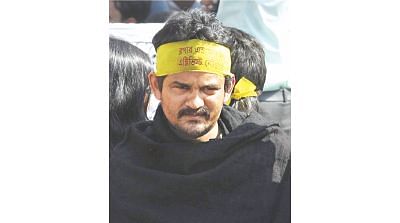<i>Under threat yet resolute </i>

Threats by Jamaat-Shibir would not deter youths from continuing Shahbagh movement, Imran H Sarker, one of the key organisers, said yesterday.
After the killing of a protester, Ahmed Rajib Haidar, on Friday, Imran said, none of the organisers felt safe but that could not damp down the call for death penalty for war criminals.
He instead vowed to strengthen the unprecedented movement that began on February 5 hours after Jamaat leader Abdul Quader Mollah was handed down life imprisonment for war crimes. The demonstrators are demanding death penalty for all war criminals, including Quader Mollah.
Imran talked to The Daily Star at the media cell of protesters at Shahbagh regarding different aspects of the movement.
Against the backdrop that the organisers have been receiving death threats by activists of the Jamaat-e-Islami and student body Islami Chhatra Shibir, he said law enforcement agencies should beef up security at the venue and ensure protection of the frontline activists round the clock.
Terming the existing security measures insufficient, he said, "Not only the movement organisers but also some newsmen and the imam, who administrated the namaz-e-janaza of Rajib, received death threats. The law enforcement agencies should be more alert."
An architect and blogger, Rajib was found stabbed dead near his house at Pallabi in the capital Friday night. The relatives and protesters claim that Jamaat-Shibir men killed Rajib to foil the movement.
Hours after the killing, protesters at Shahbagh said they were more determined to continue their protest programme.
Asked about the next course of action, Imran said they would continue the demonstration until their six-point demand submitted to the Speaker was met.
However, there may be a few changes to the pattern of the movement. The issues which are being discussed now include time frame of the movement and announcing protest programmes across the country.
"We have already gained the primary achievement as the government has amended the International Crimes (Tribunals) Act, 1973."
Asked about their announcement that they would resist today's hartal called by Jamaat, Imran said, "We have called upon all people to bring out their vehicles on roads and to keep open all the educational institutes, shops and industries, defying the hartal."
If all vehicles operate on roads and business activities are carried out as usual, the hartal will be resisted, Imran said, adding that imposing a ban on politics of Jamaat-Shibir would be a proper reply to their politics of killing and anarchy.
Their demands include death penalty for Jamaat leader Abdul Quader Mollah and all other war criminals, revocation of state power to grant amnesty to the people convicted by the international crimes tribunals, an amendment to the International Crimes Tribunal Act, allowing appeals against inadequate punishment and disposal of appeals from both the defence and the prosecution within three months of their filing and imposing a ban on Jamaat and other religion-based political parties.
"Out of six, one of our demands has been met till date," said protest organiser Bappadittya Bashu.

 For all latest news, follow The Daily Star's Google News channel.
For all latest news, follow The Daily Star's Google News channel. 




Comments